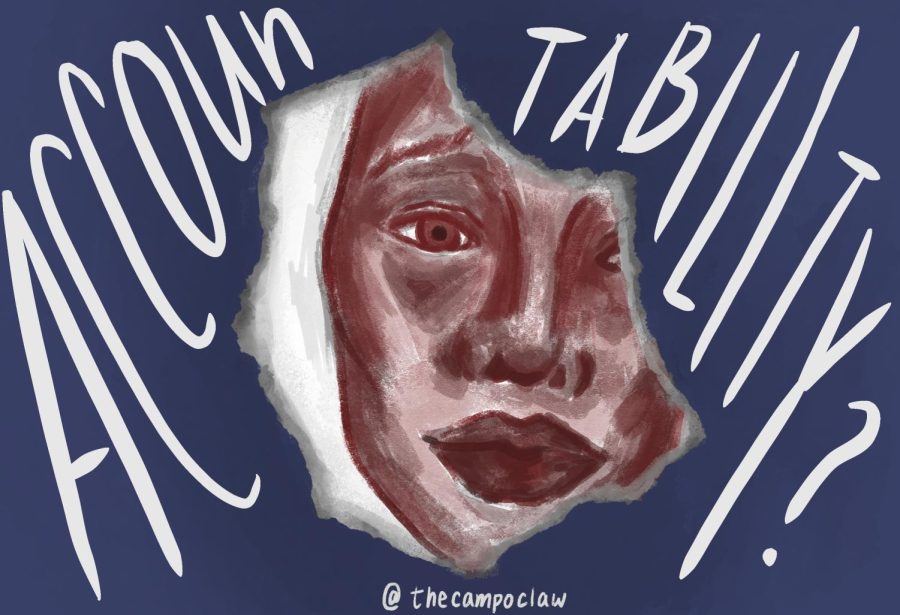Lack of Accountability In Campus Culture
Campo’s lack of accountability harms students of marginalized groups.
In the face of the 2020 Black Lives Matter protests and the COVID-19 pandemic, Campolindo has gone through multiple large-scale changes, 1 of which being the implementation of Cohort Academy via zoom during distance learning.
Every Monday, students were to attend hour-long meetings in which untrained teachers would lead superficial discussions that danced around the topic of hate, assigning busywork that ultimately aimed to make white students feel less guilty rather than effectively combating racism on campus.
The reality is that racism on campus will not be solved by students being forced to share their feelings about racism with their peers, especially not with Campo’s history of accountability, or lack thereof.
I interviewed 3 seniors, who have decided to remain anonymous, about their experiences with Campo administration’s nonresponse.
Student A received more backlash for encouraging the punishment of a racist staff member than the staff member received himself. There were moments in which she feared for her well-being so much that she had to stay away from campus.
Student B recalled how 2 girls tormented her during her freshman year. They had put multitudes of anti-asian jokes into google translate, knowing that the new girl was Chinese, and spammed them into their team group chat. The punishment was lackluster — they were only banned from participating in a couple sports events, and the student was later driven away from the team.
In another case, it took 3 separate reports, all about the same student, for administration to step in. The catalyst? The student posted pictures of lynching victims on his Instagram. His punishment was his removal of his position in the Campo musical production, and none of the students who had reported him for other instances were notified.
Student C told me about how they reported a teacher last year for multiple accounts of prejudice, and never ended up getting a response after submitting the report.
It doesn’t end there; I’ve certainly had my fair share of admin ignoring my reports of bias on campus.
There was a noticeable trend about each of these reports: even if the incident was public, such as the videos of students spouting slurs that kickstarted Campo admin’s new obsession with equity, no one was notified about any action. Rarely did Campo even get back to the students who had taken the time to report such incidents.
If something was done about any of these reports, the administration certainly didn’t tell us.
With their consistent non-response, Campolindo administration has effectively fostered an environment of hopelessness for marginalized students. Why risk reporting your teachers and peers when nothing is ever done about their prejudice?
A student recalled the few weeks in school before the campus closed for the pandemic, watching her classmates laugh at jokes about Wuhan, about Chinese people, waiting, in vain, for her teacher to call out the racist behaviour.
The videos that emerged over quarantine revealed to non-minority students just how deep the racism problem is at Campolindo.
Now that everyone is back in-person, the admin and the new branch of leadership focused on maintaining equity on campus, the Leadership Equity Council, have implemented the beginning of a series of irregular lessons on equity, based upon the same lessons taught over Zoom.
These equity lessons, just like the cohort academies, focus more energy on educating white students on non-issues, discussing the history and science behind race, and behind racism, as if these topics are ones that need to be understood.
Marginalized students are forced, just like during the cohort academies, to participate in these personal discussions about their own trauma. Teachers reaffirm that it’s normal to feel uncomfortable, all the while ignoring the well-being of the students that these lessons are meant to protect.
Instead of wasting time on discussions about compass quadrants or the science of race, these equity lessons should focus on how exactly students of colour are treated on campus. Too many students are feeling comfortable in their belief that there are no issues at Campo. This needs to stop, and the only way to make it stop is to make students face the truth.
Furthermore, the administration’s silence in response to reports of bias on campus needs to stop. Putting up with the bigotry on campus is 1 thing, but to decide to report is another. These students should be praised for their courage. They shouldn’t have to sit in fear, not knowing if there will be consequences or not.
There should be zero tolerance for incidents like these. And the only way to ensure this, is to set an example.
Your donation will support the student journalists of Campolindo High School's The Claw. Your contribution will allow us to produce more issues and cover our annual website hosting costs.

Senior V Rogers has had a passion for literature since they were young: “My bedtime stories were Baldwin and Angela Davis.” They have taken AP language...

Senior Ashley Xu has been interested in art since she was in the 3rd grade.
Xu is fascinated by iconic painters like Monet and Dali. “I like Monet’s...


